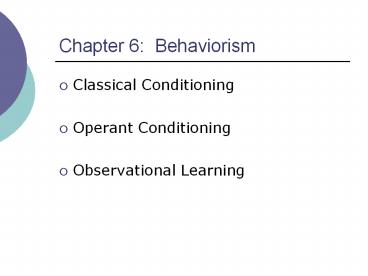Chapter 6: Behaviorism - PowerPoint PPT Presentation
1 / 27
Title:
Chapter 6: Behaviorism
Description:
Dominated Psychology in the first half of the 20th Century. ... electric shock, but not when it was followed by X rays that made them nauseous. ... – PowerPoint PPT presentation
Number of Views:77
Avg rating:3.0/5.0
Title: Chapter 6: Behaviorism
1
Chapter 6 Behaviorism
- Classical Conditioning
- Operant Conditioning
- Observational Learning
2
Behaviorism
- Dominated Psychology in the first half of the
20th Century. - Dealt with behavior only, not mental processes.
3
Classical or Pavlovian Conditioning
- Ivan Pavlov
- 1849-1936
- Russian physician/ neurophysiologist
- Nobel Prize, 1904
- studied digestive secretions
4
Classical or Pavlovian Conditioning
- Pavlovs device for recording salivation
5
Pavlovs Apparatus for Studying Classical
Conditioning in Dogs
6
Classical or Pavlovian Conditioning Respondent
Behavior
- Unconditioned Stimulus (UCS)
- stimulus that unconditionally- naturally and
automatically - triggers a response - Unconditioned Response (UCR)
- unlearned, naturally occurring response to the
unconditioned stimulus - salivation when food is in the mouth
7
Classical Conditioning Respondent Behavior
- learning in which a neutral stimulus acquires the
capacity to elicit a response after being paired
with another stimulus that naturally elicits that
response - Unconditioned response (UCR) automatic response
to a stimulus - Unconditioned stimulus (UCS) naturally and
automatically elicits a response - Conditioned response (CR) learned response to a
previously neutral stimulus - Conditioned stimulus (CS) after repeated
pairings with UCS, elicits the same response
8
Classical or Pavlovian Conditioning Respondent
Behavior
- Conditioned Stimulus (CS)
- originally neutral stimulus that, after
association with an unconditioned stimulus, comes
to trigger a conditioned response - Conditioned Response (CR)
- learned response to a previously neutral
conditioned stimulus
9
Pavlovs Classic Experiment
10
Classical or Pavlovian Conditioning
11
Classical Conditioning
12
Classic Conditioning Allows Animals to Learn to
Predict Events
- Learning theorists once believed that the
learning in classical conditioning is
unintentional and automatic (classic
behaviorism). - Most contemporary learning theorists now believe
classical conditioning involves quite a bit of
mindfulness because, (through the conditioning
process) humans and other animals are learning to
reliably predict upcoming events.
13
Classic Conditioning Allows Animals to Learn to
Predict Events
- Psychologists once believed that the key to
acquiring a conditioned response was the sheer
number of CS-UCS pairings. - However, the order and timing of CS-UCS pairings
is also very important because it provides
valuable information about the upcoming
occurrence of the unconditioned stimulus.
14
Utility Avoiding a Predators Attack through
Classical ConditioningStep 1
15
Avoiding a Predators Attack through Classical
ConditioningStep 2
16
Avoiding a Predators Attack through Classical
ConditioningStep 3
17
Stages in Classical (Pavlovian) Conditioning
- Acquisition
- the initial stage of learning, during which a
response is established and gradually
strengthened - the phase associating a neutral stimulus with an
unconditioned stimulus
18
Stages in Classical (Pavlovian) Conditioning
- Extinction gradual weakening and disappearance
of the conditioned response - Spontaneous recovery reappearance of an
extinguished response after a period of
nonexposure to the conditioned stimulus
19
After Acquisition, Other Stimuli Can Produce the
Conditioned Response
- Stimulus generalization tendency for a
conditioned response to be elicited by stimuli
similar to the conditioned stimulus
20
Generalization
21
Animals Differ in What Responses Can Be
Classically Conditioned
- Early learning theorists assumed that the
principles of conditioning were similar across
all species, but subsequent research indicates
that this assumption is incorrect. - Animals often differ in what responses can be
conditioned. - In some animals, some responses can be
conditioned much more readily to certain stimuli
than to others. - An animals biology steers it toward certain
kinds of conditioning.
22
Taste aversion study by Garcia and Koelling
- Rats learned to avoid a light-noise combination
when it was paired with electric shock, but not
when it was followed by X rays that made them
nauseous. - In contrast, rats quickly learned to avoid
flavored water when it was followed by X rays,
but they did not readily acquire an aversion to
this same water when it was followed by shock. - It is also adaptive that in taste aversion,
strong conditioning develops despite the long
delay between the CS (the taste) and the UCS (the
nausea).
23
Biological Constraints on Taste Aversion in Rats
24
Classically Conditioned Phobias
- Phobias exaggerated and irrational fears of
objects or situations - Such intense fear reactions often develop through
classical conditioning. - We can develop a phobia toward anything, but some
objects (snakes) or situations elicit phobic
reactions more easily than others.
25
Nausea Conditioning among Cancer Patients
26
Little Alberts Fear Conditioning
27
John B. Watson Famous Behaviorist
- Conditioned Emotional Responding
- Extreme Nurture (learning) position
- Fear learned through stimulus generalization?
- Emotion-evoking Advertising































